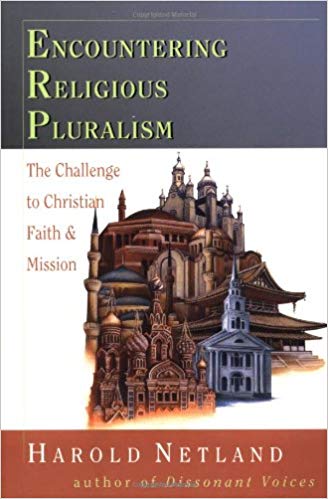A Brief Book Summary from Books At a Glance
By Steve West
About the Author
Harold Netland is a theologian, philosopher, and missiologist. He teaches at Trinity Evangelical Divinity School and is the author of several very influential books.
Introduction
Encountering Religious Pluralism examines the challenge of global religious diversity for Christian faith and mission. Netland covers biblical, theological, philosophical, apologetic, and cultural issues in his analysis. He engages extensively with John Hick’s model of religious pluralism. In the end, Netland draws together a model for thinking theologically about world religions from an evangelical perspective.
Table of Contents
Introduction
Chapter 1 Shifting Perspectives on Other Religions
Chapter 2 Contours of the Present
Chapter 3 Discovering Religious Others
Chapter 4 Religion & Spirituality in the Culture of Modernity
Chapter 5 John Hick’s Journey to Pluralism
Chapter 6 Religions & Truth
Chapter 7 The Problems of Pluralism
Chapter 8 Apologetics & Religious Pluralism
Chapter 9 Evaluating Alternative Worldviews
Chapter 10 Toward an Evangelical Theology of Religions
Summary
Introduction
Christianity has been historically tied to the West, but this is changing. Today, Christianity is weaker in the West, and Western society is religiously and ethically pluralistic. Universities are seeing more and more religious diversity. Many Westerners have adopted syncretistic practices, borrowing from Eastern religions. Today, religious pluralism is not so much a statement of fact (i.e. there are many religions), but a statement of evaluation (i.e. all religions are about equal). It is this latter sense which poses special problems; it is a different way of thinking about religions.
Christianity insists that it is only through Christ that salvation comes, and that sinners need to put their trust in him. Even in the church there are people who believe all religions are equal paths to God. This view of religious pluralism did not emerge in a vacuum; there are historical trends and explanations of which we need to be aware. John Hick is the world’s most influential philosopher of religious pluralism, and much of this book interacts with his arguments. Salvation is God’s gift and it requires a proper response. People know God but suppress the truth—this suppression, however, manifests itself in different ways in different cultures.
Chapter 1: Shifting Perspectives on Other Religions
One of the thorniest issues for theology and missions today is the relationship between Christianity and other religions. Waning confidence in orthodox Christian doctrine, combined with exposure to other religions is generating a great deal of rethinking of traditional stances. Traditionally, Christians have believed that the Scriptures are uniquely God’s Word, that Christ is the preeminent revelation of God, and that salvation only comes through trust in him. During the New Testament era, there was a great deal of religious and social foment, change, and plurality. Many accepted the rough equality of all religious practices. The modern missions movement had the centrality of the incarnate Christ—and salvation in his name—as essential doctrines, and missionaries were motivated by the plight of the lost.
The relationship between Western missions and colonialism defies simplistic analysis, but today many reduce the two to being the same thing. As Christianity grew around the world, it was attacked and grew weaker in the West. Many missionaries began to hold to an idea of fulfillment which saw Christ as the fulfillment or completion of the truth found in other religions. In the latter part of the nineteenth century, debates raged about soteriology, pluralism, and inclusivism, and they intensified in the first part of the twentieth. Questions of conversion, syncretism, and the social gospel swirled around missions. Some saw great amounts of continuity between other religions and Christianity, while others argued for discontinuity grounded in the unique and exclusive nature of Christ.
Vatican II upheld the view that some people can be saved by Christ through their own religions, and since then Roman Catholicism has continued to defend this view. Today, the debate has settled into roughly three main camps: exclusivism (although “particularism” is a better term), inclusivism, and pluralism. There is a broad spectrum in these positions, though, and the three-fold categorization needs nuance. Particularism denies that religion can save, and insists that salvation only comes through Jesus Christ, who is the unique Son of God incarnate, and through whose work comes grace and salvation. Inclusivists hold to the uniqueness of Christ but believe that his saving work and grace can be found in other religions (where it is not explicitly understood). Pluralism maintains that there is a basic equality in all religions, and they equally lead to salvation or enlightenment.
Chapter 2: Contours of the Present
Over the last century, inclusivist and pluralist positions have grown in popularity, even inside of the church. Explaining the current view of religious pluralism on the basis of postmodern relativism is inadequate. Postmodernism is dependent on modernism, but neither term has been clearly defined. Postmodernism can refer to a shift in historical or technological epochs (although there is no consensus as to when this occurred), to ideological critiques, philosophical and literary theories, a methodology of inquiry, and more. Methodological postmodernism rejects epistemological foundationalism and universal truth claims.
Foucault, Derrida, Lyotard, and Rorty are leading postmodern theorists. Often modernism is equated with Enlightenment philosophical approach to epistemology and progress. The Enlightenment thinkers had confidence in human reason to discover objective truth, rejected traditional authorities, traditions, and superstitions, trusted in scientific progress, and thought that humanity could be improved. It is this worldview that postmodernism rejected. Simply identifying the Enlightenment with modernism, however, is too simplistic. Enlightenment thinkers were not as enamored with human reason as many seem to think they were; they had confidence in reason, but many were also skeptical. Reason was to be used to evaluate religious claims and other authorities, and it was used to attack Christianity. Empiricism became ascendant.
[To continue reading this summary, please see below....]The remainder of this article is premium content. Become a member to continue reading.
Already have an account? Sign In
